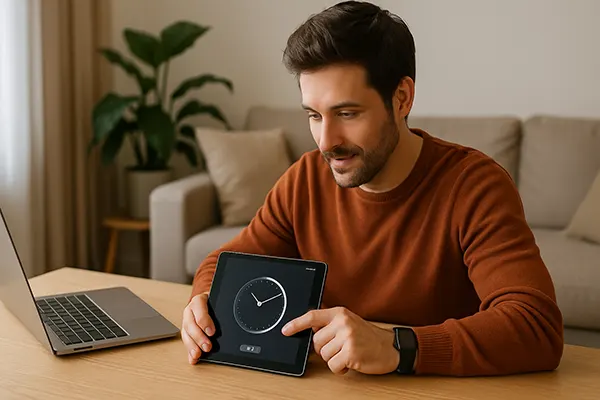“Smart Betting”: Mobile Apps for Budget Control and Time Management While Gambling
Responsible gambling is no longer a vague recommendation but a measurable practice. In 2025, technological solutions are helping users take charge of their gaming routines, using dedicated mobile apps to control spending, monitor time online, and maintain mental balance. These tools are not about restriction—they’re about awareness, structure, and self-discipline.
Budget Management Apps for Casino Players
Financial discipline is one of the foundations of healthy gambling habits. Apps like Spent, Wally, and YNAB (You Need A Budget) allow users to track every deposit and withdrawal, categorise expenses, and get monthly overviews. Many modern apps integrate with banking services, making it easier to monitor casino-related spending in real time.
One of the most notable tools in 2025 is Gamban’s new partnership with Revolut, which enables users to activate gambling blocks across their accounts, not just filter access to websites. This deeper integration ensures budget controls are not bypassed accidentally or impulsively.
Players can set custom alerts for budget thresholds. Once the limit is exceeded, the app notifies users instantly and can even suggest taking a break or reviewing recent sessions. This level of interactivity has proven highly effective for those prone to emotional or impulsive gambling patterns.
Features That Encourage Self-Control
In addition to passive monitoring, apps like BetBlocker and GamCare’s MyGamCare tool provide behavioural nudges. For instance, when a user approaches their spending limit, the app can recommend practical steps such as lowering deposit limits or scheduling a financial review.
Some apps now include gamified elements to encourage discipline. For example, they reward users with badges for every week they stay within their self-imposed budgets. These small motivators have shown positive psychological effects, fostering a sense of control and achievement.
Data privacy and trust are critical factors. Most of these tools operate under strict GDPR-compliant policies, ensuring that personal financial data remains confidential and secure. Reviews from tech watchdogs like Which? and Consumer Reports in 2025 have confirmed their reliability.
Time Management Tools and Session Monitoring
Many mobile apps now include features for managing gaming time. Tools such as StayFree and ActionDash allow players to track how many minutes or hours they spend on gambling apps each day. With built-in timers and usage reports, players can identify unhealthy patterns early.
Apps with customisable notifications have gained popularity in 2025. Players can configure reminders to take breaks every 30, 60, or 90 minutes. These prompts appear directly on the screen, gently nudging the user to pause and assess their state of mind.
Some tools go further by locking players out of gambling apps once a daily time limit has been reached. This preventive measure ensures that extended play sessions do not occur unintentionally, especially during emotionally vulnerable moments.
Combating Time Distortion During Play
One of the key risks in gambling is time distortion—losing track of how long one has been playing. To address this, session trackers like BetTime integrate with major casino operators’ apps. These trackers provide real-time counters visible during play, helping users stay grounded.
Push notifications summarising time spent per session are sent out after every logout. These can include comparative stats—for example, how today’s session compares to the user’s weekly average. This allows players to reflect and make informed decisions moving forward.
In-app analytics also present users with visual data—graphs, heatmaps, and time distribution charts. This visualisation helps identify peak playing hours and encourages scheduling sessions only during predefined “safe” times.

Combining Budget and Time Monitoring for Holistic Control
While some apps focus solely on finances or time tracking, integrated solutions offer the most value. Applications like Gamalyze and Mindful Gambler provide an all-in-one suite, where users can set financial goals, monitor time, assess risk levels, and receive psychological feedback.
In 2025, AI-powered analysis is being used more widely. These apps can detect emotional patterns based on play habits—such as increased playtime after losses—and offer tailored recommendations or suggest taking a short break. Some even integrate with mental health services for those who want additional support.
Such combined tools are especially helpful for users who struggle with both impulsive spending and extended sessions. Their reports allow self-assessment and improvement over time, with clear metrics for accountability. The user retains full control but benefits from structure and feedback.
Long-Term Benefits of Structured Gambling
Gambling mindfully brings long-term advantages. Players who regularly use self-monitoring apps report higher satisfaction, reduced financial regret, and fewer sleep disruptions. It also builds discipline applicable to other areas of life.
For those at risk of developing harmful habits, early warnings from these apps can lead to proactive intervention. In the UK, the National Gambling Helpline has begun integrating referral options through these tools, streamlining access to help.
Ultimately, the purpose of these apps isn’t to restrict pleasure but to maintain balance. Informed choices, time awareness, and financial planning ensure that gambling remains a controlled form of entertainment, not a disruptive force.
